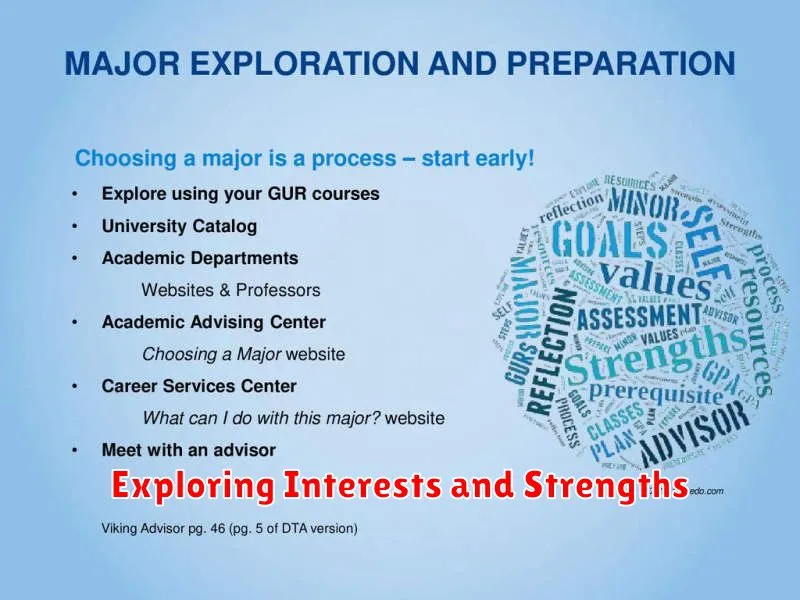Choosing the right university major is a pivotal decision that significantly impacts your future career path and personal fulfillment. This comprehensive guide provides prospective students with the essential tools and insights to navigate the often daunting process of selecting a university major. We’ll explore key factors to consider, including your interests, skills, career goals, and the specific university programs available. Understanding these elements will empower you to make an informed choice aligned with your individual aspirations and potential.
From exploring different academic disciplines to understanding market trends and career prospects, this guide offers a structured approach to choosing a university major. We will delve into self-assessment techniques to help you identify your strengths and passions, research strategies to investigate various majors, and resources to connect with academic advisors and professionals in your fields of interest. By following this guide, you’ll gain the clarity and confidence necessary to select a university major that sets you on the path to a successful and rewarding future.
Why Your Major Matters
Your choice of major is a significant decision that can influence your career path, future earnings potential, and overall job satisfaction. It’s not just about picking a subject you enjoy; it’s about investing in a field of study that aligns with your skills, interests, and long-term goals.
Career Alignment: A well-chosen major can provide you with the foundational knowledge and specialized skills required for specific career paths. While not all majors directly translate into a specific job title, they equip you with the critical thinking, problem-solving, and analytical abilities valued by employers across various industries.
Earning Potential: Different majors often lead to varying salary expectations. While passion should be a factor, it’s important to be aware of the potential return on investment your chosen field offers. Researching average salaries and job growth projections for careers related to your prospective major can be a valuable exercise.
Personal Fulfillment: Your major shapes your academic experience and influences the type of work you’ll pursue. Aligning your studies with your genuine interests can lead to greater engagement with your coursework, increased motivation, and a more fulfilling career.
Exploring Interests and Strengths

Choosing a university major is a pivotal decision. A key factor in making this decision is a thorough understanding of your own interests and strengths. Self-assessment is crucial in this process.
Consider what subjects genuinely captivate you. What topics do you find yourself researching or reading about in your free time? These inherent interests can indicate potential academic pursuits you’ll find fulfilling.
Identifying your strengths is equally important. Are you a skilled writer? Do you excel at problem-solving? Perhaps you have a knack for critical thinking or a talent for quantitative analysis. Recognizing these strengths can help you pinpoint majors that align with your abilities and offer opportunities for success.
Various tools can assist in this self-discovery process. Personality tests and career aptitude assessments can provide valuable insights into your natural inclinations and potential career paths. Consultations with career counselors or academic advisors can also offer guidance and support in exploring your options.
Career Outlook and Industry Trends
Understanding current career outlook and industry trends is crucial when selecting a university major. A degree should ideally position you for a thriving career in a growing field. Researching future job prospects can help avoid choosing a major with limited opportunities.
Reliable resources for this information include government agencies like the Bureau of Labor Statistics, professional organizations, and industry publications. These resources often provide data on projected job growth, salary expectations, and required skills for specific occupations.
Consider the impact of emerging technologies and automation. Some fields are experiencing rapid transformation, creating new career paths while rendering others obsolete. For instance, data science and cybersecurity are high-growth areas fueled by technological advancements. By analyzing these trends, you can make more informed decisions about which fields offer the best long-term career prospects.
Talking to Advisors and Mentors
Connecting with academic advisors and mentors is crucial in making informed decisions about your major. Advisors possess in-depth knowledge of university programs and can offer valuable insights into various fields of study. They can help you understand curriculum requirements, career paths, and the overall academic landscape.
Mentors, often professionals working in your field of interest, provide real-world perspectives. Discussions with mentors can clarify your understanding of day-to-day realities within specific professions and help you assess whether your interests align with the practical aspects of a particular career.
Prepare a list of questions beforehand to maximize the value of your interactions with advisors and mentors. Be open to exploring different options and consider their advice alongside your own research and self-reflection. These conversations can significantly clarify your academic and professional goals.
Double Majors and Minors Explained

Beyond selecting a single major, you have options to further specialize or broaden your academic pursuits. A double major involves completing the required coursework for two separate academic disciplines. This results in earning two distinct degrees, demonstrating expertise in both fields. A double major requires significant dedication and careful planning due to the increased course load.
A minor, on the other hand, is a secondary concentration of study that complements your major. It involves a smaller set of required courses, providing a valuable breadth of knowledge in a related or even entirely different field. A minor can enhance your primary area of study or offer a valuable skill set that makes you a more well-rounded candidate in the job market.
When and How to Switch Majors
Deciding to switch majors is a significant decision. It’s important to recognize the right time and understand the necessary steps involved. Don’t feel discouraged – many students change their major at least once.
When to Consider Switching
Common signs it might be time for a change include consistent disinterest in your coursework, poor academic performance despite effort, and a lack of enthusiasm for future career prospects related to your current major. Feeling constantly stressed or overwhelmed by your chosen field can also be a strong indicator.
How to Switch Majors
First, consult your academic advisor. They can help you understand the implications of switching, such as potential credit loss or changes to your graduation timeline. They can also guide you through the process specific to your university. This usually involves submitting a formal request to the department of your intended major. Be prepared to provide a rationale for your decision. Research the new major thoroughly, including course requirements and career paths, to ensure it’s the right fit.
Top Resources for Making Decisions
Choosing a university major is a significant decision. Utilize available resources to make an informed choice. Start with academic advisors. They can provide insights into program requirements and career paths.
Departmental faculty are another valuable resource. Speaking with professors allows you to learn about specific research areas and course content.
Career services offices can help you explore career options related to different majors. They often offer career assessments and connect students with alumni in chosen fields.
Don’t underestimate the value of peer networks. Talking to current students in different majors provides firsthand perspectives on the coursework and overall experience.

